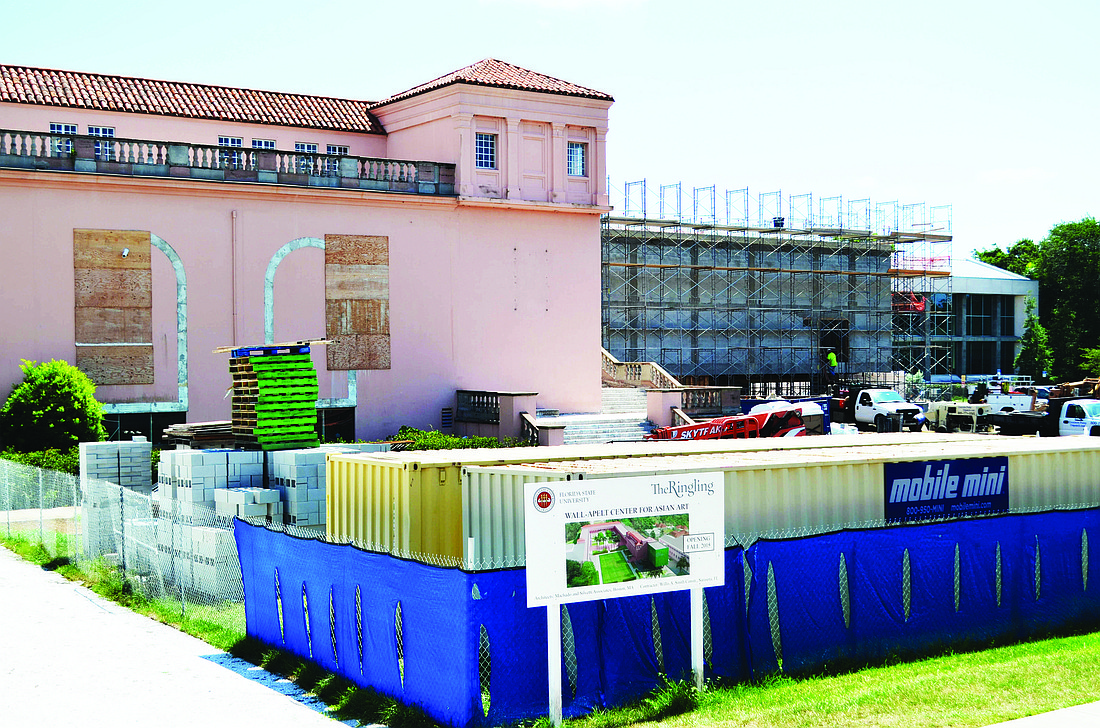- April 24, 2024
-
-
Loading

Loading

With work already underway on the John and Mable Ringling Museum of Art’s center for Asian art, a major donor has reclaimed her gift slated for exhibition in the new wing — and is fighting for the return of more than $6 million in financial contributions and damages.
In 2006, Sarasota resident Helga Wall-Apelt made a multitiered gift of her estate, including her Asian art collection, to The Ringling. She donated $4 million to construct and expand the west wing to house the collection, to be known as the Dr. Helga Wall-Apelt Gallery of Asian Art. Additional donations included more than $2 million as an endowment to hire a curator and another $2 million upon the wing’s completion to help maintain and support the collection.
According to recent legal documents, the donation is worth more than $60 million to The Ringling. That makes it the largest gift received by the museum and largest single gift to Florida State University, per an FSU News archive.
But now, Wall-Apelt wants her gifts returned.
In January, Wall-Apelt sued The Ringling Museum, Florida State University and Florida State University Foundation for mishandling her funds and breaching their contract.
According to the complaint, the original 2006 gift agreement included a requirement to locate matching funds, which the defendants did not adhere to within the agreed upon timeline. In December 2007, Wall-Apelt donated a gift of $6.1 million that had to be matched with state funds obtained by the museum, Florida State University, and Florida State University Foundation. The agreement stated that this money would be used toward construction and renovation of the west wing of the museum.
By Dec. 27, 2010, the deadline established in the agreement for generating matching funds, the defendants hadn’t received the money. Steven High, executive director of The Ringling, said funds were difficult to acquire from the state due to the economic downturn. A year later, the defendants said they were able to independently raise the funds without assistance from the State of Florida Matching Funds Program, which led to an amended agreement with Wall-Apelt that called for construction on the project to begin immediately.
However, the suit alleges, the defendants had not actually obtained the matched funds required. Instead, Florida State University Foundation, Ringling Museum of Art Foundation and the museum entered a memorandum of understanding with one another. Per that memorandum, a temporary bridge loan was designed to last until FSU received $4.1 million in matching funds requested from and approved by the state. In July 2011, the State of Florida Matching Funds Program was suspended indefinitely.
According to the complaint, Wall-Apelt wasn’t informed of the memorandum of understanding. High could not comment on the specifics of the complaint, but he said the defendants disputed the allegation that they had failed to live up to their agreement with Wall-Apelt.
“We feel we’re meeting all the terms of the gift agreement,” High said.
James Berenthal, Wall-Apelt’s attorney, says the museum withheld her collection while it was on loan to them. Part of the initial gift agreement stated that the museum would exhibit and maintain the collection. According to Berenthal, The Ringling has not allowed her to check on the status of the collection.
The Ringling broke ground on the $10 million Asian art center in January, the same month that Wall-Apelt filed suit to reclaim her artwork and money. Although the suit was filed after the beginning of construction, Berenthal said Wall-Apelt had begun the process of attempting to have the gift returned earlier than that.
“They didn’t start construction until (after) we commenced renegotiations to get the gift back,” Berenthal said. “… They are constructing something there — for what purpose, we still don’t know.”
High said that, regardless of the results of the case, The Ringling is dedicated to completing the new wing, which is scheduled to open in early 2016. He also said that they hope to amicably resolve the disagreement with Wall-Apelt and satisfy the original terms of the donation.
“We’re committed to doing the project,” High said. “The project is going to happen. We’re also committed to meeting the terms of the gift agreement, so we anticipate this to be a short-term issue.”
Defendants’ motions to dismiss the case and to change venues to Tallahassee were denied by Judge Charles Williams during a July 23 hearing. The museum has agreed to return Wall-Apelt’s collection, but the money remains in question. Berenthal said the fate of Wall-Apelt’s art is still unknown as she awaits a response to her complaint from the defendants.
“No decision has been made as to what is going to transpire,” Berenthal said. “We still have to complete the case.”
Contact David Conway at [email protected]